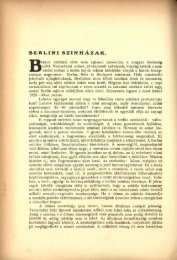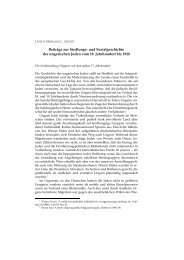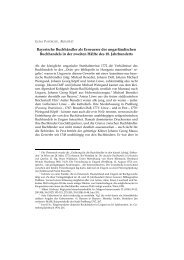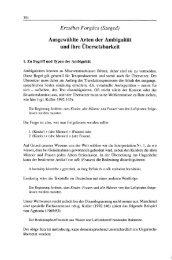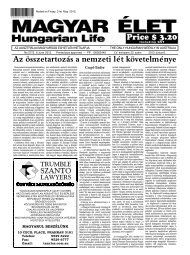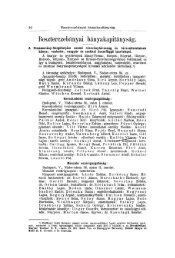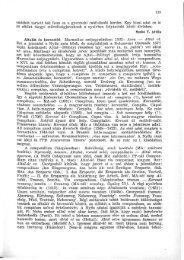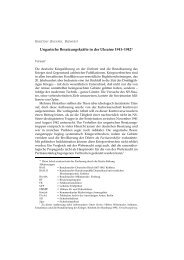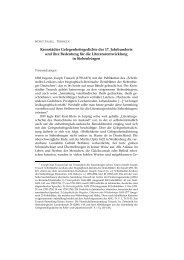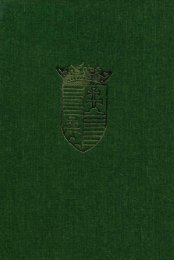Osservatorio letterario ANNO 14. – NN. 73/74 MARZ.-APR./MAGG ...
Osservatorio letterario ANNO 14. – NN. 73/74 MARZ.-APR./MAGG ...
Osservatorio letterario ANNO 14. – NN. 73/74 MARZ.-APR./MAGG ...
You also want an ePaper? Increase the reach of your titles
YUMPU automatically turns print PDFs into web optimized ePapers that Google loves.
as co-author of Henry VIII and The Two Noble<br />
Kinsmen Titus Andronicus may have undergone more<br />
rewrites, than a Hollywood screenplay, with alleged<br />
input from Marlowe, Thomas Kyd, Robert Green and<br />
George Peel. Recent debate has centred on Thomas<br />
Middleton’s possible contribution to Macbeth.<br />
III.<br />
Shakespeare wrote some of the best parts for<br />
himself.<br />
There is no reason to doubt that Shakespeare acted in<br />
his plays. Some scholars like to believe that he played<br />
the characters who control the actions like a director,<br />
for instance the Duke in Measure for Measure and<br />
Prospero in The Tempest.<br />
IV.<br />
Shakespeare was a Catholic.<br />
In Elisabeth’s reign Catholicism was synonymous with<br />
treason, yet quasi-Catholic imagery in some of the<br />
dramas ― notably the return of the ghost from the<br />
purgatory in Hamlet ― has prompted suggestions<br />
that Shakespeare privately inclined toward Rome. The<br />
fact that his father, John, was fined by the protestant<br />
authorities for non-attendance at church has added<br />
weight to this myth.<br />
V.<br />
Shakespeare was a soldier.<br />
Numerous theories try to explain his “lost years” ―<br />
the decade between his marriage to Anne Hathaway<br />
and the arrival on the London theatre scene is<br />
1592.Some conclude that the plays battle scenes owe<br />
much to Shakespeare’s experiences of war in Flanders<br />
(Duff Cooper called his 1940s biography Sergeant<br />
Shakespeare). Others argue that the vivid descriptions<br />
of Italy mean that Shakespeare spent time there.<br />
VI.<br />
Shakespeare was a teacher.<br />
For this one we must thank John Aubrey, whose 1697<br />
collection of potted biographies, Brief Lives, noted that<br />
Shakespeare “had in his younger years been a<br />
schoolmaster in the country”. Early this century E.K<br />
Chambers discovered in the papers of an Elizabethan<br />
Catholic family in Lancashire a reference to a “William<br />
Shakeshaft”, who may have been the family tutor.<br />
VII.<br />
Shakespeare was an adulterer.<br />
If you accept that the mysterious Dark Lady of the<br />
Sonnets existed, then she was married, had black hair<br />
and eyes and was the poet’s mistress. If you accept the<br />
Sonnets as autobiography ― Wordsworth called them<br />
the key with which Shakespeare unlocked his heart” ―<br />
then our Will must have done the dirty on Hathaway.<br />
But nobody has any clues about the “Dark Lady’s<br />
identity. In his fine 1993 book, “Shakespeare: The<br />
Truth” that distinguished historian, Desmond Oliver<br />
Dingle (aka the actor Patrick Barlow) suggested instead<br />
that the Bard concealed the Dark Lady’s name not<br />
“because he had anything to be ashamed of, but<br />
because he had absolutely no idea who she was.<br />
VIII.<br />
Shakespeare was bisexual.<br />
More than 100 of the Sonnets are written to or about a<br />
handsome, aristocratic youth, commonly identified as<br />
Henry Wriotesley, 3 rd Earl of Southampton. Whoever<br />
this “Lascivious grace in whom all ill well shows” was,<br />
there is a temptation to believe that Shakespeare’s<br />
feelings for him went beyond platonic admiration. The<br />
myth was fuelled by Frank McGuinness in his 1997<br />
play: Mutabilitie. McGuinness leaves two actors<br />
stranded with Shakespeare in Ireland is 15 98 and has<br />
them crack jokes about the Bard voracious homosexual<br />
appetite.<br />
IX.<br />
Shakespeare had a love-child.<br />
The Restoration playwright, William D’Avenant claimed<br />
to be Shakespeare’s bastard son. D’Avenant’s mother<br />
kept an inn at Oxford and to break the journeys<br />
between Stratford and London, Shakespeare may well<br />
have stopped off for a bed and bawd. D’Avenant was<br />
born in 1606, when Shakespeare was 42.<br />
X.<br />
Shakespeare was a poacher.<br />
Rumours in the17s century (lent credence in the 1930s<br />
by sleuthing of the Canadian academic Leslie Hotson)<br />
put it about that Shakespeare had been prosecuted by<br />
Sir Thomas Lucy for poaching deer from his estate just<br />
ourside Stratford. Shakespeare allegedly took revenge<br />
by writing a satirical ballad, was prosecuted again and<br />
had to leave Stratford. He then caricatured Lucy as<br />
Justice Shallow in The Merry Wives of Windsor.<br />
XI.<br />
Shakespeare was a teenage<br />
Animal rights activist.<br />
In his introduction to the 1709 edition of the plays,<br />
Nicholas Rowe, Shakespeare’s first real editor<br />
biographer, notes that the Bard’s father was a dealer in<br />
animal skins. Rowe adds that young Will used to hate<br />
seeing calves slaughtered (for making vellum) and<br />
would make speeches” in pity” for the poor animal’s<br />
fate. If that’s true, he must have hated his time in<br />
another occasionally mooted occupation ― as a<br />
Stratford butcher’s apprentice.<br />
XII.<br />
The Bard died from booze.<br />
The final myth suggests Peter Holland of the<br />
Shakespeare institute, is that Shakespeare may have<br />
died from a cold brought on by a heavy drinking<br />
session with Ben Johnson and the poet Michael<br />
Drayton. To believe or not to believe? That is the<br />
question? ― The Times ―<br />
DR. BENKŐ MIHÁLY KELETI MAGYAROK<br />
KUTATÁSAIRÓL<br />
I. BEVEZETÉS <strong>–</strong> SZINTÉZIS<br />
Dr. Benkő István: Keleti magyarok<br />
(Ellenszélben)<br />
„Ünnepnapja ez a magyar tudománynak” mondta<br />
Harmatta János akadémikus Benkő Mihály 2001-ben<br />
148<br />
OSSERVATORIO LETTERARIO Ferrara e l’Altrove <strong>A<strong>NN</strong>O</strong> XIV <strong>–</strong> <strong>NN</strong>. <strong>73</strong>/<strong>74</strong> <strong>MARZ</strong>.-<strong>APR</strong>./<strong>MAGG</strong>.-GIU. 2010


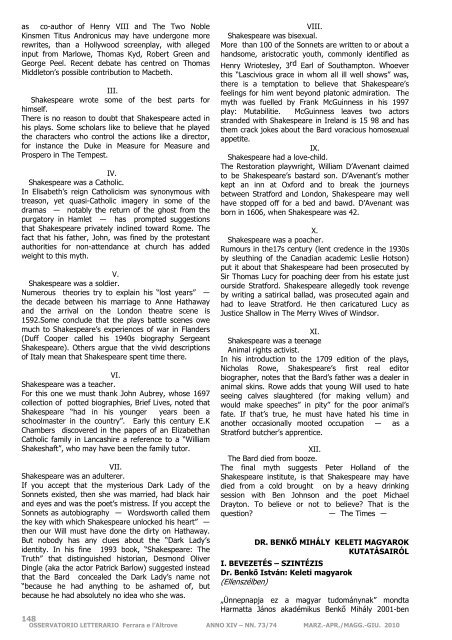
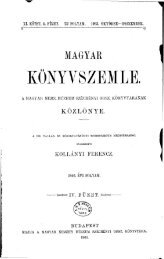
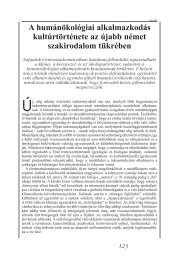
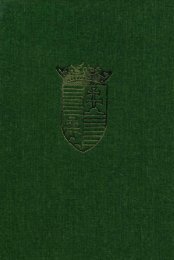
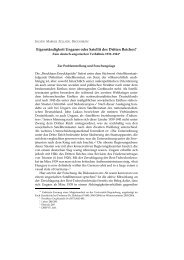
![Letöltés egy fájlban [36.8 MB - PDF] - EPA](https://img.yumpu.com/23369116/1/172x260/letoltes-egy-fajlban-368-mb-pdf-epa.jpg?quality=85)
